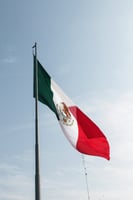Introduction Mexico's immigration landscape is constantly evolving. This article outlines key...
Mexico City Consider Tax on Digital Nomads: What You Need to Know
The recent influx of digital nomads to Mexico City has raised concerns about the impact of gentrification on local communities. In response, Frida Guillén, a PAN deputy, has proposed a tax on "digital nomads" for each additional night of accommodation beyond their original stay. Let's take a closer look at what this proposal entails.
The Problem of Gentrification
As a result of the Covid-19 pandemic, Mexico City has seen an increase in foreigners, particularly young digital nomads, who have chosen to work remotely from the city. This has led to a significant occupancy of lodging platforms in popular neighborhoods such as Roma, Condesa, and Polanco. Unfortunately, this influx has also caused an increase in the cost of apartment rentals, cafés, restaurants, and other products and services, directly impacting the residents of Mexico City.
The Proposal
Frida Guillén's proposal aims to address the issues arising from gentrification, long-stay tourism, and digital nomadism. It suggests adding a section to the tax code of Mexico City, specifically focusing on urban sanitation rights. Under this proposal, foreigners would be required to pay urban sanitation rights for various lodging services, including hotels, motels, timeshares, platform stays, apartments, and houses.
The Tax on Digital Nomads
The tax on "digital nomads" would be calculated as one Unit of Measure and Update (UMA), equivalent to 103.4 pesos per additional night beyond the originally contracted term. The revenue generated from this tax would be allocated to urban development, transportation, and housing projects in Mexico City, aiming to counteract the negative effects caused by these activities.
Next Steps
The proposal has been sent to the finance and tourism committees for review. These committees have up to 40 days to approve, modify, or reject the proposal before it goes to the plenary for further discussion. If approved, it would need to be published in the Official Gazette to come into effect.
It is important to note that there is currently no approximate date or certainty regarding the implementation of this tax. The proposal is still under review, and its future remains uncertain.
As Mexico City continues to grapple with the challenges brought about by the rise of digital nomads, this proposed tax aims to address the concerns of local residents and support urban development initiatives. Stay tuned for updates on the outcome of this proposal and its potential impact on the digital nomad community.


%204.42.06%20p.m..png?height=200&name=Captura%20de%20pantalla%202024-08-20%20a%20la(s)%204.42.06%20p.m..png)
%204.45.04%20p.m..png?height=200&name=Captura%20de%20pantalla%202024-08-20%20a%20la(s)%204.45.04%20p.m..png)
